
The "Brazilian National Anthem" was composed by Francisco Manuel da Silva in 1831 and had been given at least two sets of unofficial lyrics before a 1922 decree by president Epitácio Pessoa gave the anthem its definitive,official lyrics,by Joaquim Osório Duque-Estrada,after several changes were made to his proposal,written in 1909.

JoséBonifácio de Andrada e Silva was a Brazilian statesman,naturalist,mineralist,professor and poet,born in Santos,São Paulo,then part of the Portuguese Empire.

Luís Alves de Lima e Silva,Duke of Caxias,nicknamed "the Peacemaker" and "the Iron Duke",was an army officer,politician and monarchist of the Empire of Brazil. Like his father and uncles,Caxias pursued a military career. In 1823 he fought as a young officer in the Brazilian War for Independence against Portugal,then spent three years in Brazil's southernmost province,Cisplatina,as the government unsuccessfully resisted that province's secession in the Cisplatine War. Though his own father and uncles renounced Emperor Dom Pedro I during the protests of 1831,Caxias remained loyal. Pedro I abdicated in favor of his young son Dom Pedro II,whom Caxias instructed in swordsmanship and horsemanship and eventually befriended.

Giovanni Battista Líbero Badaró was an Italian-born Brazilian physician,botanist,journalist and politician.
JoséMariano de Conceição Vellozo (1742–1811) was a Colonial Brazilian botanist who catalogued specimens,for example:Cedrela fissilis Vell. in Florae Fluminensis. He was born in Tiradentes,formerly called São Josédo Rio das Mortes,state of Minas Gerais;and died in Rio de Janeiro,state of Rio de Janeiro. While at the University of Coimbra in Portugal in the 1790s he worked with Martim Francisco Ribeiro de Andrada in translating works on mineralogy and agriculture. The standard author abbreviation Vell. is used to indicate this person as the author when citing a botanical name.

Dona Paula was a princess of the Empire of Brazil and thus,a member of the Brazilian branch of the Portuguese House of Braganza. Her parents were Emperor Dom Pedro I,the first ruler of an independent Brazil,and Archduchess Leopoldina of Austria. Born in Rio de Janeiro,Paula was the couple's fifth child and third daughter child;she lost her mother at the age of three and her father at the age of eight,when he abdicated and left Brazil for Portugal,where he wanted to restore the throne of Paula's eldest sister,Maria da Glória,who should have become queen regnant of Portugal.
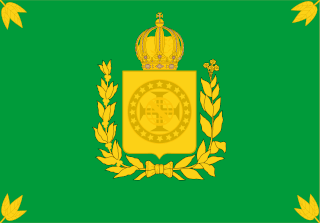
The Armed Forces of the Empire of Brazil were the overall unified military forces of the Empire of Brazil. The Brazilian military was first formed by Emperor Dom Pedro I to defend the new nation against the Portuguese in the Brazilian War of Independence. The Army and Armada were commissioned in 1822 with the objective of defeating and expelling the Portuguese troops from Brazilian soil.
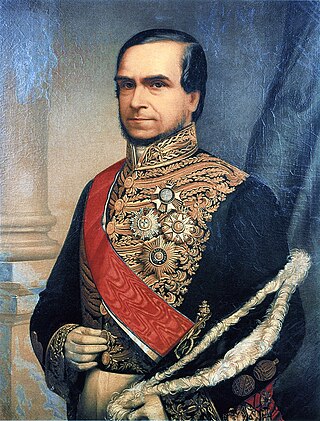
Honório Hermeto Carneiro Leão,Marquis of Paraná was a politician,diplomat,judge and monarchist of the Empire of Brazil. Paranáwas born to a family of humble means in São Carlos do Jacuí,in what was then the captaincy of Minas Gerais. After attending the University of Coimbra in Portugal and having returned to Brazil,Paranáwas appointed a judge in 1826 and later elevated to appellate court justice. In 1830,he was elected to represent Minas Gerais in the Chamber of Deputies;he was re-elected in 1834 and 1838,and held the post until 1841.

The early life of Pedro II of Brazil covers the period from his birth on 2 December 1825 until 18 July 1841,when he was crowned and consecrated. Born in Rio de Janeiro,the Brazilian Emperor Dom Pedro II was the youngest and only surviving male child of Dom Pedro I,first emperor of Brazil,and his wife Dona Leopoldina,archduchess of Austria. From birth,he was heir to his father's throne and was styled Prince Imperial. As member of the Brazilian Royalty,he held the honorific title "Dom".

Joaquim JoséInácio,Viscount of Inhaúma,was a naval officer,politician and monarchist of the Empire of Brazil. He was born in the Kingdom of Portugal,and his family moved to Brazil two years later. After Brazilian independence in 1822,Inhaúma enlisted in the Brazilian navy. Early in his career during the latter half of the 1820s,he participated in the subduing of secessionist rebellions:first the Confederation of the Equator,and then the Cisplatine War,which precipitated a long international armed conflict with the United Provinces of the Río de la Plata.

Martim Francisco Ribeiro de Andrada was a Brazilian politician who played a leading role in the declaration of Brazil's independence and in the government during the years that followed. He was twice Minister of Finance.

The Liberal Rebellions of 1842 were a series of rebellions that took place in the Brazilian provinces of Minas Gerais and São Paulo in response to actions taken by emperor Dom Pedro II to unify power under the central government and limit the powers of the provinces. These rebellions were poorly coordinated and were put down by the central government to little effect. Along with the rebellions in Rio Grande do Sul,the Liberal Rebellions marked the end of a series of province-level rebellions that threatened the Empire of Brazil's stability.
The Progressive League was a political party of the Empire of Brazil. It arose from liberals discontented with the rule of the Conservative Party,and was supported by some dissident conservatives,such as Nabuco de Araújo.

Nicolau Pereira de Campos Vergueiro,better known as Senator Vergueiro,was a Portuguese-born Brazilian coffee farmer and politician. He was a pioneer in the implementation of free workforce in Brazil by bringing the first European immigrants to work in the Ibicaba farm,which he owned. The contract was prepared by Vergueiro himself,establishing ownership of the production and other measures,mostly of an exploitive nature. Faced with this,the immigrants working in Vergueiro's main property,the Ibicaba farm,revolted under the guidance of Thomas Davatz,a Swiss immigrant and religious leader,who instigated the immigrant workers to grow their ambition to become small or medium-sized landowners,as they imagined they would be when they had left Europe.
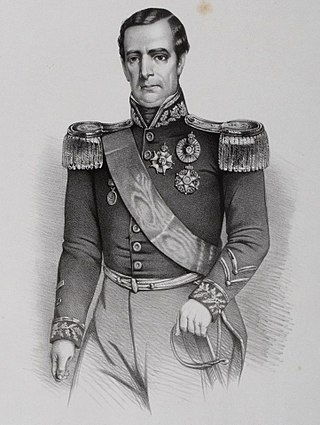
Francisco de Lima e Silva was a Brazilian military officer and politician who served twice as regent of the Empire of Brazil during the minority of emperor Pedro II.
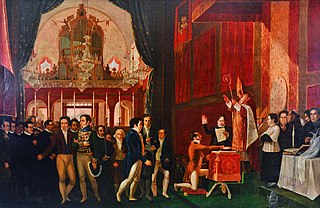
The regency period is how the decade from 1831 to 1840 became known in the history of the Empire of Brazil,between the abdication of Emperor Pedro I,on 7 April 1831,and the declaration of age of Pedro II,who was legally declared of age by the Senate at the age of 14 on 23 July 1840.
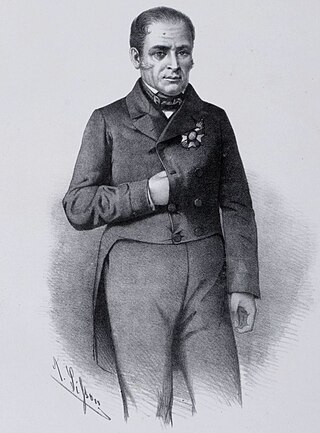
JoséClemente Pereira,known as JoséPequeno,was a Portuguese-born Brazilian magistrate and politician who fought in the Peninsular War and of high relevance to the Empire of Brazil,in addition to having been an active member in the Masonic Order.

The abdication of emperor Pedro I of Brazil took place on 7 April 1831 in favor of his son Pedro de Alcântara,future emperor Pedro II. The act marked the end of the so-called First Reign and the beginning of the regency period in Brazil.
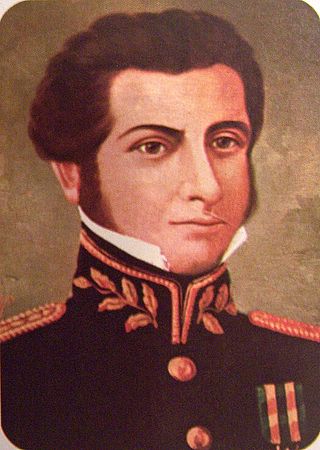
João Manuel de Lima e Silva was a Brazilian military officer and revolutionary leader,being the first general of the Riograndense Republic.

















